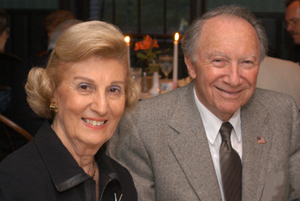 WILLARD HACKERMAN, Engr 1938, and his wife, LILLIAN PATZ HACKERMAN, were both prominent in Baltimore and Maryland civic life. Mr. Hackerman served for years as a university trustee, then trustee emeritus. He joined the Whiting-Turner Contracting Company after graduating from Hopkins and considered G.W.C. Whiting his mentor. For over 50 years, Mr. Hackerman served as president and chief executive officer of Whiting-Turner, overseeing the construction of many distinctive buildings throughout the country. He chaired the committee that established the Whiting School in 1979. In 1990, he received an honorary degree from Hopkins. The Hackermans contributed to the creation of Hackerman-Patz House, a residence for oncology patients, and to the new cancer clinical and research buildings. In 2005, Mr. Hackerman established the Hackerman Polytechnic Scholarships, which provide full tuition for graduates of the Baltimore Polytechnic Institute who have been admitted to the Whiting School as undergraduates.
WILLARD HACKERMAN, Engr 1938, and his wife, LILLIAN PATZ HACKERMAN, were both prominent in Baltimore and Maryland civic life. Mr. Hackerman served for years as a university trustee, then trustee emeritus. He joined the Whiting-Turner Contracting Company after graduating from Hopkins and considered G.W.C. Whiting his mentor. For over 50 years, Mr. Hackerman served as president and chief executive officer of Whiting-Turner, overseeing the construction of many distinctive buildings throughout the country. He chaired the committee that established the Whiting School in 1979. In 1990, he received an honorary degree from Hopkins. The Hackermans contributed to the creation of Hackerman-Patz House, a residence for oncology patients, and to the new cancer clinical and research buildings. In 2005, Mr. Hackerman established the Hackerman Polytechnic Scholarships, which provide full tuition for graduates of the Baltimore Polytechnic Institute who have been admitted to the Whiting School as undergraduates.
In 2010, the Computational Science and Engineering building–which opened on the Decker Quad in 2008 as a headquarters for advanced interdisciplinary research crossing the borders of engineering, computer science, mathematics, and medicine–was rededicated as Hackerman Hall to recognize Mr. Hackerman’s philanthropic support of the university. Mr. Hackerman passed away in 2014, and his wife followed him in 2020.
Previously held by:
- Ross B. Corotis, PhD (1982-1994)
- Bruce R. Ellingwood, PhD (1997-2000)
- Robert A. Dalrymple, PhD, Willard and Lillian Hackerman Professor Emeritus (2002-2016)
